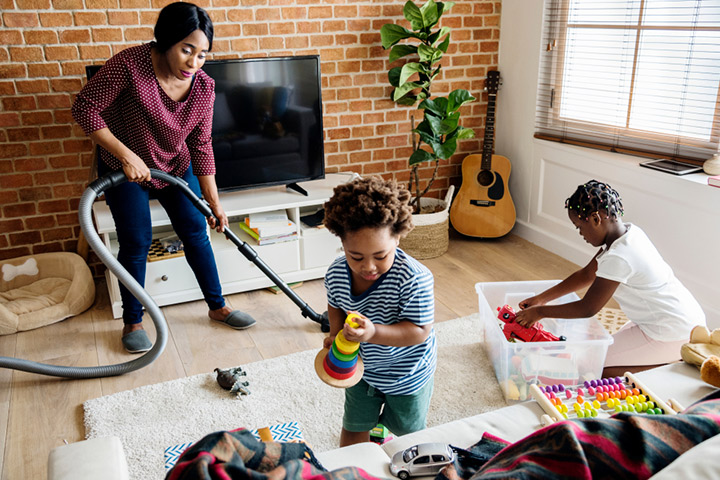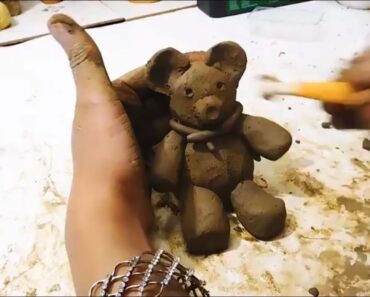Motivating a child to perform household chores is good parenting as it instills responsibility in the child and helps build character. Moreover, doing chores teaches children essential life skills, boosts their self-esteem, and makes them feel they have accomplished something during the day.
However, it is common to see children resist and make excuses when it is time for chores. Mom/Dad, why do I have to clean my bed? “My friend doesn’t do any chores at home; why do I have to?” are a few common complaints most parents hear from their children when asked to participate in household chores.
This is where a chore chart for kids comes in handy. Read on as we tell you why you should create a chore chart, what you could include in it, and how you can get your child to do chores without much fuss.
Importance Of A Chore Chart For Children
Every individual must know how to do the household chores, and it is best taught to children when they are young. To ensure a smooth-functioning home, it is a good idea to get all members of the family acquainted with using a chore chart.
However, you may wonder if it is a good idea to teach children how to use one. Creating a chore chart has many benefits. It helps you
- Set out clearly defined responsibilities to everyone in the house, including your children.
- Set a subtle reminder for everyone to complete their tasks for the day.
- Teach children to be accountable for their responsibilities.
- Demonstrate to children the importance of creating charts and lists.
It is easy to create a chore chart for your family and children.
- The first thing you need to do is list out all the activities that need to be performed during the day, week, or month.
- If you wish to assign days or dates for these activities, it may be a good idea to use a calendar.
- Next, ask each family member, including your children, what tasks they would like to do and assign them those tasks accordingly.
- When it comes to young children, you can offer a few choices and ask them to pick from them.
- Ensure you assign age-appropriate tasks to your children.
Things To Include In A Chore Chart
While you might know how beneficial doing chores is for children, have you ever wondered about the right type of chores for your child at different ages?
The following points will help you assign age-appropriate chores for your child.
Children in this age group require some guidance to do chores as they have just started learning about the world around them. So you can maintain a simple pictorial chore chart for them. Make it a fun activity by letting them place a star sticker on a task they have completed.
Some chores that can be added to their chore chart include
- Put the toys in the bag or bucket after play.
- Sort the clothes by color.
- Put the dirty clothes in the laundry basket.
- Pick the clothes to wear for an outdoor trip.
- Wipe spills with a cloth.
- Put water or food in a pet’s bowl.
Children at this age love their independence and will be more than glad to follow instructions given by you. Use simple instructions, such as, “Put it in the trash bin,”“Bring the shopping bag,” and “Put the glass in the basin,” to teach your toddler to engage in simple chores. You could also do a chore with them and encourage them to copy what you do.
At this age, your child is more responsible. If your toddler has been acquainted with doing simple chores, they will be more confident in doing slightly more complex chores with supervision as they turn four or five years old. Also, at this age, they can be taught to use a family chore chart.
The following are a few things you could include in the family chore chart.
- Close any container that you open.
- Put away your toys in a bin after play.
- Help mommy and daddy prepare food.
- Hang the towels up in the washroom
Children in this age group are preschoolers and can perform simple tasks assigned to them independently. Here are some chores that you could include in the family chore chart for your child aged six and seven years.
- Make the bed at night and in the morning with help.
- Cut your food and eat.
- Brush teeth and comb hair.
- Remove the dishes from the dishwasher.
- Bring your school and lunch bags from the bus/car.
- Set the table and clear it with help.
- Assist mommy and daddy in preparing food.
- Fold clothes with help.
At this age, children can be taught how to use a chore chart without supervision and complete simple tasks independently. Here are some chores that can be included in their chore chart.
- Make the bed.
- Complete homework on time.
- Get dressed with no help from parents
- Pack lunch.
- Set the table for a meal with minimal help.
- Keep the bedroom and study table tidy.
- Pack the bag for school the next day.
- Wash dishes
- Clean the bathroom with help.
- Wash the car with help.
- Rake the leaves.
At this age, children need minimal to no supervision. Here are some chores that you could encourage them to include in their chore chart.
- Take care of personal hygiene.
- Keep the bedroom clean.
- Make the bed every morning.
- Water the plants.
- Set the alarm clock and wake up to it every morning.
- Help in dishwashing.
- Assist in prepping for meals.
- Take the trash out.
- Operate the washer and dryer and do the laundry every day.
How To Involve Children In Chores?
Although children are often enthusiastic about helping around the house, household tasks may not hold their interest for too long. However, as parents, you know the importance of teaching them to be independent and responsible. Thus, getting everyone to do chores is a healthy family practice, and each member could use some help.
Here are some handy tips to help your children participate in household chores more willingly.
1. Create a sense of value in doing household chores
Before instilling the importance and value of household chores in your child, you need to understand it too. If you and your partner firmly believe in the value of doing household tasks, your children will imbibe it from you. Such children are less likely to delay or resist performing chores assigned to them.
2. Offer options to your children
Allow your child to choose chores they would like to do each day. Each child is different, and they might like a few chores over others. Children tend to be more responsible when they have a say in what they are doing.
3. Assign chores based on your child’s temperament
Consider your child’s age and temperament when assigning them chores. Some children are agile and quick at doing tasks allotted to them, while others are more likely to finish their tasks early and may be up for a few more. Similarly, some children may be good with clearing away things, while others may be good with some other tasks that require patience. It is therefore recommended to allot chores to your child based on their nature.
4. Listen to any complaints they may have
Assigning chores to your child is not as easy as it appears, and you are sure to hear complaints and whining voices. Listen to your child’s concerns and address them with empathy and compassion. Try and resolve any issue your child may be facing with their assigned chore. Further, ensure their complaint is resolved in a way that helps them understand the importance of performing the chore rather than avoiding their responsibility altogether.
5. Make household chores a part of the family’s routine
While doing the dishes is mummy’s duty every day, doing the laundry is daddy’s duty. Establishing a routine with household chores integrated into it helps make doing a chore a habit. As a family, everyone above the age of three years can contribute to household chores in one way or the other.
6. Divide the tasks equally
Whether you have one child or more, always divide the chores equally among family members. Avoid burdening your child with too many chores as this will put them off. This is where a chore chart is extremely useful.
7. Make household chores fun
Doing household chores is not just about following the chore chart. Playing music or leaving humorous notes as reminders is an excellent way to keep the atmosphere light while encouraging your children to help you with chores.
8. Use a reward system
Using a reward system acts as a positive reinforcement for your child. It motivates them to give their 100% when doing a chore. However, ensure you do not overdo this.
9. Have off-days together
Accept it–no one likes to do household chores! This applies to your children too, who, eventually, will want to bail out. A good way to avoid this is to have off-days during the week. Pick a Saturday or Sunday when everyone in the house has an off from household chores and duties. This is also a good opportunity to spend some quality family time together.
10. Keep it consistent
Consistency is a sign of good parenting. This applies to performing household chores too! Establishing a routine for your child and including household chores in their daily routine ensures they are consistent in completing their share of duties. At the same time, you should be consistent in doing your chores and be a good role model.
11. Instill responsibility in your child
Doing household chores is a good way to make your child responsible. At the same time, children must be taught about the consequences of not doing a chore. This will ensure your child does not crib about doing chores but instead does them as they would do any other routine activity.
While many parents feel guilty about burdening their children with household chores, you must remember that getting them to do daily chores is a way of preparing them for life.
It may appear challenging to involve them in many chores as they get busy with school and studies, but some basic chores such as tidying up their room, getting dressed, fetching water, and packing their lunch must become a daily habit rather than being looked at as a chore. Apart from using a physical chore chart, you can also try chore apps on your smartphone.



![PARENTING TEENS -PART1| [MOTIVATIONAL & INSPIRATIONAL TALKS] | by RICHA PARENTING TEENS -PART1| [MOTIVATIONAL & INSPIRATIONAL TALKS] | by RICHA](https://usparenting.com/wp-content/uploads/2020/09/1600770148_hqdefault-370x297.jpg)






























